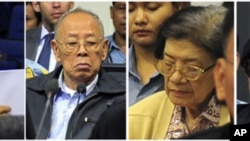Officials for Japan and France said Wednesday they want to see proceedings toward a trial of four Khmer Rouge leaders advance, with experts speculating a full trial won’t begin until next year.
Both countries are major supporters of the tribunal, which is gearing up for a major atrocity crimes trial of four jailed leaders—Nuon Chea, Khieu Samphan, Ieng Sary and Ieng Thirith.
The health and ability of three of the leaders, excluding Khieu Samphan, were evaluated by the Trial Chamber of the tribunal this week.
Nuon Chea, the regime’s chief ideologue, told the court he would have difficulty physically attending all-day hearings, while a geriatrician employed by the court said his evaluation of Ieng Thirith, who is the wife of Ieng Sary and was the regime’s social affairs minister, showed she suffered from mental health issues that meant she had spotty recollection of the past.
Judges will have to consider this weeks’ hearings, a process that will likely push back the start date of a full trial, which is now not expected until early next year.
Still, donors said they want the trial to proceed with haste—and fairness.
“While respecting the independence of the court, we hope that the court shares the same concern for fair, efficient, and expeditious proceedings in order to deliver justice for the Cambodian people,” Masaki Kawaguchi, first secretary of the Embassy of Japan, told VOA Khmer in an e-mail. He said, however, “It is not appropriate to put any conditions on the court” to push it forward.
France, too, “obviously wants the tribunal to make decisions and conduct its hearings in a timely manner,” Dominique Mas, first consular of the French Embassy, said in an e-mail. He stressed the importance of the court’s work “in accordance with the rules of justice and the rights of defendants and plaintiffs.”
US Embassy spokesman Sean McIntosh said the US continues to support the tribunal’s work “to bring justice to those former senior Khmer Rouge’s for the crimes that they committed against humanity.”
Tribunal officials welcomed the support of donors and said the court is working the best it can. Court spokesman Huy Vannak said the court hoped to begin the case by the end of this year. Other experts, however, say it will likely take longer to begin.
At its inception in 2006, the tribunal was thought to take three years, but by 2009 it had only held one trial, of torture chief Duch. The court has continued to face economic pressures, and officials said recently it would only have enough money to operate through November without a new influx of funding. No new funds have yet been pledged.
Kawaguchi and Mas said their respective countries had not yet scheduled meetings for further funding.
In the context of the global economic crisis, Mas said, “It is important that everyone become aware of the budgetary difficulties that may arise in the judicial activities.”
Kawaguchi said a “slow process” would impact funding, but that the Japanese government was “closely” following court proceedings as it considered further contributions.




